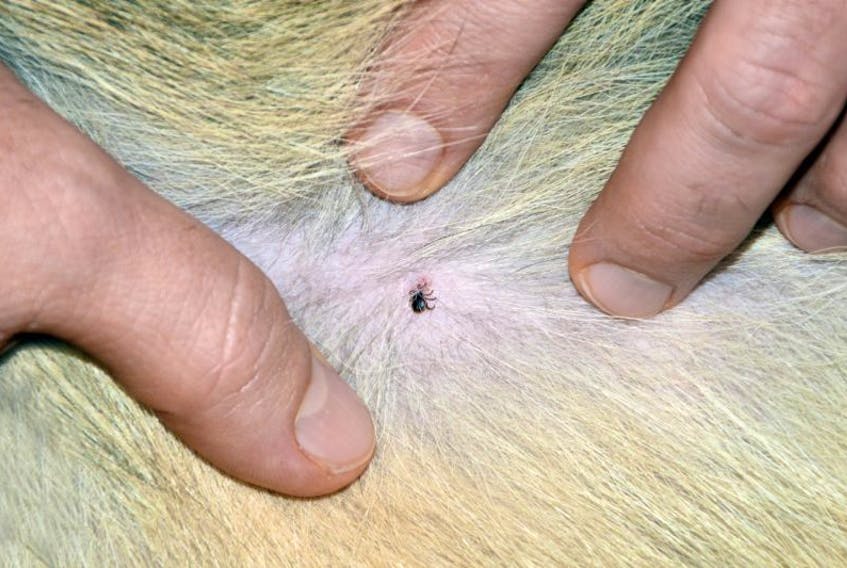Despite there being multiple diagnoses of Lyme disease in dogs in Corner Brook last year, Ian Crane believes people and their pets still have little to worry about.
The Corner Brook veterinarian, who operates the Animal Surgery and Wellness Centre, was the first animal doctor to diagnose Lyme disease in a domestic pet on the island of Newfoundland.
That was in 2004, three years after the bacteria that causes Lyme disease was first detected on Newfoundland. The dog Crane diagnosed had not been off the island and no tick was present when it was examined.
Related stories:
Corner Brook vet confirms first local case of Lyme disease this season
Man claims he contracted Lyme disease decades ago
Corner Brook veterinarian expects hard ticks population to grow in province
There is only one species of tick that can infect animals and people with Lyme disease. Ixodes scapularis, better known as the blacklegged or deer tick, is not native to Newfoundland, and Crane said there is still no known breeding population on the island.
The ticks that are found here either have been imported by animals that have recently been to the mainland or are flown in on migratory birds returning to Newfoundland in the spring. In recent years, the species of tick that carries Lyme disease has been expanding its territory into the northeastern United States and the Maritimes.
Crane said he diagnosed a dog last year, but it had been in the United States and was likely infected there.
Angela Martyn, a vet at the Animal Health Centre in Corner Brook, diagnosed a dog last year that had not left the island.
“Certainly, you will see occasional cases, but I don’t think a lot has changed since,” said Crane of any increased risks since the first diagnosis in 2004.
“It may be coming more prevalent, but there is still not a breeding population of (the bacteria-carrying) ticks here.”
Crane, who operates his clinic only three days a week, said he has not seen any of the worrisome species of ticks in the last three years.
Michael Tipple, a veterinarian at Humber Valley Veterinary Clinic in Corner Brook, said his clinic has removed at least five of the blacklegged ticks in the last few weeks.
Those ticks had been sent off to be positively identified and Tipple said his clinic is now awaiting the results of testing that would determine whether or not the ticks were carrying the bacteria that causes Lyme disease.
“We are seeing an increasing number from year to year,” said Tipple, who noted his clinic also confirmed a case of Lyme disease last year.
The Humber Valley Veterinary Clinic has been posting videos of tick removal procedures done at the clinic on its Facebook page.
Tipple said people should always check their dogs and themselves too if they have been in typical tick habitat, such as tall grass or shrubbed or wooded areas. He said animals that frequent such areas should also be on some sort of flea and tick prevention regime.
Crane said he would never talk anyone out of taking such precautions or even vaccinating against Lyme disease, but the hype is somewhat overblown for Newfoundland.
“I get people coming in totally scared out of their mind about ticks, but the reality is it is not as big a problem as you sometimes hear,” said Crane. “The same ticks that attach to dogs also attach to people. If you think about all the stuff you’ve heard about animals, how much have you heard about people?
“I think there are companies that make tick products, and maybe some other individuals, that may be looking at generating a little bit of fright and scare people into purchasing products.”
For more information on Lyme Disease, visit http://www.health.gov.nl.ca/health/lyme_disease.html
What the province is saying about ticks and the risk of Lyme disease:
The Department of Fisheries and Land Resources, Animal Health Division, does not conduct formal surveys of the numbers of ticks in the province.
The Animal Health Laboratory accepts submission of ticks taken from humans or animals for identification. It then sends the ticks that are known vectors of disease, including those that commonly carry Lyme disease, to the National Microbiology Lab, where further testing is done to determine if individual ticks are carrying diseases important to human or animal health.
The provincial department’s laboratory provides results from ticks that private veterinarians submit for testing, and may discuss a case or possible case, but does not record or keep this data.
It is sometimes difficult to get a definitive diagnosis of Lyme disease; often a clinical or presumptive diagnosis is made without a definitive laboratory diagnosis. The Animal Health Division does not test blood from dogs for Lyme disease at its laboratory.
There were three cases of Lyme disease in humans in Newfoundland and Labrador between 2012 and 2017, with two cases reported in 2015 and one in 2016. In all three of these cases, the disease was contracted outside of Newfoundland and Labrador.
Source: Government of Newfoundland and Labrador









